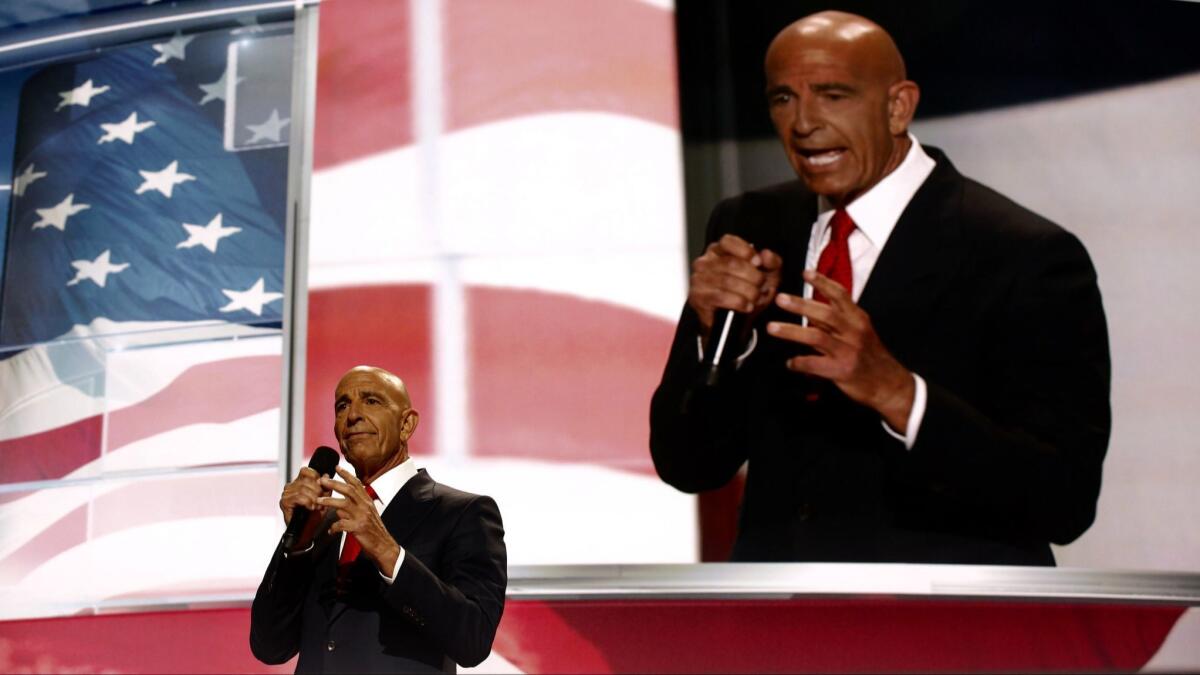Tom Barrack, a Trump ally with fingers in many pies

- Share via
Tom Barrack’s route to becoming one of the most influential people in America has been to help everyone he could, and ask for little in return.
As a private equity investor, Barrack appeared to break every rule. The founder of Colony Capital let wealthy friends in on lucrative deals, such as the takeover of the Miramax film empire, which he completed with “The West Wing” star Rob Lowe. He kept celebrities out of bankruptcy, helping Michael Jackson avoid eviction from his Neverland ranch, and coming to the aid of photographer Annie Leibovitz. When Harvey Weinstein fell from grace amid allegations of serial sex abuse, Barrack tried to buy his movie studio.
His talent for sealing property deals cemented lasting associations with everyone from Middle Eastern royals to a flamboyant New York real estate developer on course for high office. Since Donald Trump became president, Barrack has enjoyed a direct line to Washington, capping a three-decade career in which he shuttled by private jet among real estate deals and a California estate where he makes wine and plays polo. “Karma really works,” Barrack said some years ago. “It works, eventually.”
But karma cuts both ways, and last week a congressional report identified Barrack as a key figure in a raft of initiatives that “virtually obliterated the lines normally separating government policymaking from corporate and foreign interests.” Drawing on private emails and text messages with business executives, diplomats and White House insiders, including Trump’s son-in-law Jared Kushner, the report provided a candid firsthand account of his efforts at private diplomacy.
The exchanges show the Lebanese American deal-maker trying to buy the nuclear reactor maker Westinghouse using Saudi and Emirati capital, while securing enough U.S. ownership to bypass scrutiny from official bodies. It was allegedly described as part of an American effort to help Saudi Arabia “leapfrog Iran” and become a “leader” in nuclear power. Barrack cooperated with the investigation but took issue with its conclusions, according to people familiar with his thinking, adding that he believes it conflates his proposal for a “Middle East Marshall Plan” with a later, abortive attempt to buy the nuclear company.
Middle Eastern diplomats sometimes struggled to think up enough requests for Barrack. “Thanks to you, I’m in consistent contact with Jared,” gushed Yousef al-Otaiba when Barrack offered to set up meetings and asked for a “hit list” of administration figures. Eventually the United Arab Emirates ambassador, whose wife owns a fashion brand, suggested a meeting with First Lady Melania Trump’s stylist. “This may be way out of your lane,” he wrote, “but it’s the only thing I can think of.”
As the global recession deepened in 2008, Tom Barrack was in his element.
Born in California in 1947, Barrack was the grandson of Lebanese Christians fleeing Ottoman atrocities who set off for Brazil but ended up disembarking at New York’s Ellis Island. He attended Catholic school in downtown Los Angeles. (“It was either that or juvenile detention center,” he has said, “and Loyola High School was cheaper.”) At nearby USC, where he played rugby and earned a bachelor’s degree before studying law, he was already paying into the karma bank. “If you ever needed the shirt off somebody’s back, Tom would be the first person to give it to you,” says a person who knew him then.
As a young lawyer, he was dispatched to Saudi Arabia to handle contracts for the construction group Fluor. He ended up playing squash with Saudi royalty, a connection that later proved useful when a client was trying to obtain permission to build an oil refinery in Haiti. The transaction hinged on access to Saudi crude, so Barrack took the Texan oilman and two Saudi princes to meet the island’s dictator, Jean-Claude “Baby Doc” Duvalier. They closed the deal, although not before Duvalier had laid claim to a diamond-encrusted watch one of the royals was wearing.
Back home, Barrack was appointed to the Interior Department during the Reagan administration after loaning $70,000 to the buyer of a house belonging to Edwin M. Meese, then a White House official. (An independent counsel found no evidence that Meese knew of the loan.) Later, he worked for Texas billionaire Robert Bass, where he was a contemporary of TPG founder David Bonderman, and handled the 1988 sale of New York’s Plaza Hotel to Trump.
He struck out on his own in the 1990s recession, founding Colony to snap up real estate at rock-bottom prices. But later deals soured, and earlier this year the Financial Times presented data suggesting that investors lost about 3.7 cents for every dollar they invested in 18 private equity funds that Colony raised between 1991 and 2015. (Colony disputes the data, methodology and conclusion that investors lost money.)
The father of six introduced Trump at the Republican National Convention and chaired his inauguration committee. But he failed to win appointment as a Middle East envoy, despite lobbying foreign leaders to intervene with Kushner.
Still, his Levantine philosophy maintains that karma is a force that takes time.
“The negative connotation is that a Lebanese will give you their shirt, give you their wallet … and ultimately will probably end up with yours,” he once explained. “But this is the art of life.”
© The Financial Times Limited 2019. All Rights Reserved. FT and Financial Times are trademarks of the Financial Times Ltd. Not to be redistributed, copied or modified in any way.
More to Read
Inside the business of entertainment
The Wide Shot brings you news, analysis and insights on everything from streaming wars to production — and what it all means for the future.
You may occasionally receive promotional content from the Los Angeles Times.











